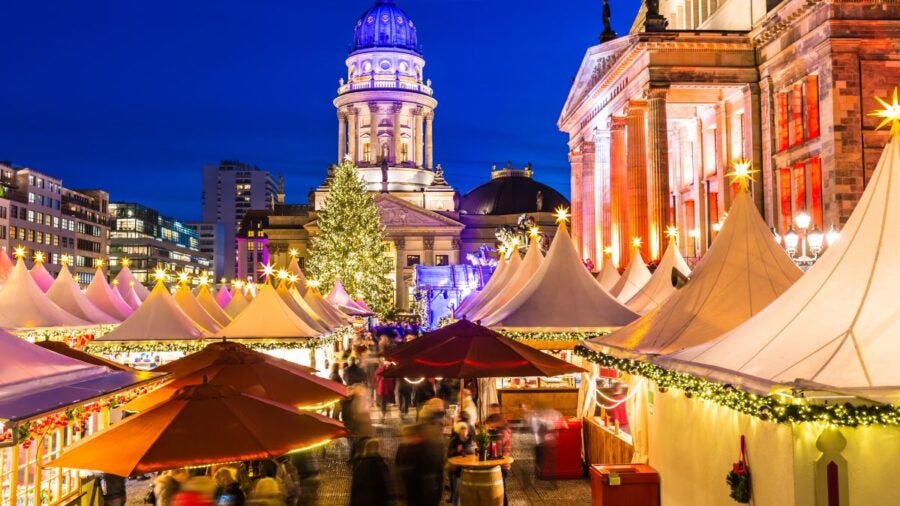For years, Berlin’s economy has lagged behind more prosperous cities in the west and south of Germany. In fact, until as recently as 2016, the GDP per capita of the country would improve if Berlin didn’t exist.
This apparent underperformance, when comparing it to the economic success of other European capitals, can be attributed to a number of historic factors. Germany’s late unification in 1871 resulted in a decentralised economy, while the split of East and West in the aftermath of the Second World War has long stymied growth in the areas around Berlin. The city also had to undergo a long rehealing project following the fall of the Berlin Wall in 1990.
However, high levels of investment are now flooding into Berlin, with a particular focus on startups and technology businesses. Wages are going up, and the city that was once viewed as a cultural and artistic hub is now a viable option for industry too, attracting workers from across the globe.
Why is Berlin popular with startups?
Atomico’s 2021 State of European Tech Report estimates $7.1bn (£5.9bn) was invested in technology startups in Germany’s capital in the previous 12 months, the second highest in Europe behind London. Growth has been steady and sustained, with investment increasing by 150% year-on-year since 2017.

Nicola Di Nardo, CTO and co-founder of Feedel Ventures, says: “Berlin attracts workers from all over the world. There are more opportunities for founders from different countries than in, say, Paris, where French companies are favoured.”
Last year the startup raised €1.5m (£1.3m) in investment, and now has 15 employees in its studio. Despite being headquartered in Puglia, Italy, the company is decentralised, with staff working across Europe. Di Nardo made the decision to relocate to Berlin, thanks to the opportunities to access capital and make connections in Berlin’s thriving tech ecosystem.
He also cites the city’s abundance of co-working locations, and their relative low cost, as another positive for fledgling companies. “It’s a cheap place to start a company and much cheaper again in comparison to Paris or London. For founders in their first year that’s an important consideration.”
How much can you earn in Berlin?
The average salary for workers in the state of Berlin stands at €53,408 (£46,901), around €3,000 (£2,635) less than the typical wage for a German worker, according to a 2021 survey by the jobs listing site Stepstone.
Compared to other major German cities, Berliners wages lag further behind. As centres for high-earning industries such as financial services and banking, workers in affluent cities in the South and West of the country such as Frankfurt (€66,529 or £58,424), Munich (€65,164 or £57,225) and Cologne (€59,418 or £52,179) all report significantly higher levels of earning.
Historically, these centres of industry have also demanded a higher cost of living. This gap has likely decreased. Inflation in Germany topped 10% in 2022, resulting in a real wage decrease of 4.1%, pinching budgets in the capital and the country at large. However, several government initiatives, including tax rebates to cover energy bills, and a nationwide €49 (£43) monthly travelcard, is helping residents hold onto their cash.
What is the working culture in Berlin like?
Hard work is valued, but so is the ability to relax. Retailers and supermarkets are closed on Sundays and public holidays, while most cafes have a strict ‘no laptop’ policy at the weekend.
“There is a different mindset here: people are less stressed about work,” says Di Nardo. “Even as an entrepreneur, you can find your balance between work and personal life. It’s a different mindset to other cities.”
There is a different mindset here: people are less stressed about work
It is common for native workers to take large parts of the summer off. July and August are typically the quietest months in the city, as many families decamp to other parts of the country or the continent for lengthy holidays.
English is increasingly the lingua franca, especially at younger companies. A study of job postings in the city’s technology sector revealed that 75% were written in English; and the majority of Berliners have functional English.
Whether you pick up the language or not, it’s important to develop a thick skin. Germans are known for their brutal honesty, but this shouldn’t be confused with rudeness. Berliners are even more notorious for their sharp tongues; ‘Berliner Schnauze’ — directly translating as ‘Berlin snout’ — is an often-used metaphor to describe the city’s proclivity for curtness.
Finding a place to live in Berlin
Berlin has seen radical change in the past thirty years, and that is reflected in its housing market. Renting remains the norm, with 1.6 million of Berlin’s 2 million housing units currently being leased, according to the local government.
Government restrictions on development, married with a soaring rise in demand have seen prices rise steeply. According to academics at Humboldt University, average rents have increased by 140-200% since 2006.
A study by the estate agency Guthmann & Guthmann estimates the median monthly rental price for an average sized apartment (79 metres squared), in a building built before 2015 is €1,160 (£1019) per month before bills. However, this number can be much higher in central boroughs.
In the affluent area of Tiergarten the average monthly rent stands at €2,300 (£2,020) per month. In Friedrichshain, a popular district for younger workers in east Berlin, the median rent stands at €1,422 (£1,249) a month.
Berlin attracts workers from all over the world
Attempts to control the market have proven unfruitful. Rent caps brought in by the Berlin Senate were declared unconstitutional by Germany’s Federal Government in 2021. In the same year, a referendum to take public control of 240,000 housing units owned by large public companies was overwhelmingly passed by residents of the city, but the law has yet to come into effect.
It is therefore common for expat workers to stay in temporary housing, often at an inflated cost, as they look for long-term solutions.
“The flat search in all major cities in Germany has become increasingly competitive. It may take several months to find a place,” says Tia Robinson, co-founder and CEO of Expath, a consultancy that helps foreign workers manage German bureaucracy. “We usually recommend that expats moving here book a furnished sublet for the first two to three months.”
Dealing with German bureaucracy
Foreign workers will also be weary of Germany’s famous bureaucracy. For example, upon moving to the country, residents are expected to receive an ‘Anmeldung’ (proof of address) appointment with their local government office. These often prove a stumbling block for foreign workers of all types, says Robinson, herself an expat from the US.
“Germany is a very bureaucratic and non-digital country which surprises many people who come expecting well-designed efficiency,” she explains. “Appointments at public offices can take months to get and usually happen in German - our clients are often surprised they can’t attend appointments in English.”
Non-EU workers will need a working visa. For employees, this will involve proof of a job offer and sponsorship from your organisation, while entrepreneurs and freelancers are expected to prove proof of funds and a business plan to gain access.
“It affects companies, too,” Robinson explains. “Starting Expath took us several months, costing several thousand Euros for lawyer and notary fees. I speak fluent German and still wouldn’t have dared to do this without the help of a good lawyer and tax advisor.”
Robinson recommends that anyone hoping to set up a company in Berlin seek the advice of professionals with innate knowledge of Germany’s tax and employment law, and that all workers should arrive with three to six months of living costs to cover their expenses while acclimating to German society.
A city of history, culture and expression
Despite these barriers, Berlin remains a popular destination for people seeking history, culture and nightlife.
Landmarks such as the Berlin Wall and Checkpoint Charlie stand as reminders of how far the city has come in the past 30 years. More discerning culture buffs will enjoy art galleries such as Gropius Bau, and museums including Otto Weidt Workshop and the Topography of Terror, which don’t shy away from the darker periods of the country’s history.

Since the wall fell, the German capital has become one of the most liberal cities in the world. Berlin’s senate estimates there were 5,000 protests within the state in 2016 alone, the highest in Europe.
This freedom of expression bleeds into the city’s nightlife. Sex, drugs and gender are all explored on Berlin’s hallowed dancefloors.
Berghain, the city’s most famous club, is renowned for its strict door policy. Revellers often queue for upwards of four hours, with no guarantee of entry. Tourists are unlikely to get in without functional German, and while this might seem antithetical to the city’s liberal ideals, Berliners view their nightlife culture as something to protect from outside influence.
For those who prefer a more relaxed evening, there is still plenty to offer. During the winter months, Germany’s famous Christmas markets spring up in the city centre and surrounding towns.
In the summer, al fresco dining and drinking is the norm, with Berliners sprawling out across the city’s parks and riverside bars. On the weekend, large chunks of the population decamp to the surrounding lakes to swim.
According to Robinson, this variety of entertainment and Berlin’s livability remains an attractive destination for people of all walks of life despite an increased cost of living. “The draw of Berlin is still the freedom to pursue whatever lifestyle you want, whether that’s as a tech founder, parent, kink lover or eco warrior.”
You can read more from our Working Around the World series here.
For years, Berlin’s economy has lagged behind more prosperous cities in the west and south of Germany. In fact, until as recently as 2016, the GDP per capita of the country would improve if Berlin didn’t exist.
This apparent underperformance, when comparing it to the economic success of other European capitals, can be attributed to a number of historic factors. Germany’s late unification in 1871 resulted in a decentralised economy, while the split of East and West in the aftermath of the Second World War has long stymied growth in the areas around Berlin. The city also had to undergo a long rehealing project following the fall of the Berlin Wall in 1990.
However, high levels of investment are now flooding into Berlin, with a particular focus on startups and technology businesses. Wages are going up, and the city that was once viewed as a cultural and artistic hub is now a viable option for industry too, attracting workers from across the globe.

